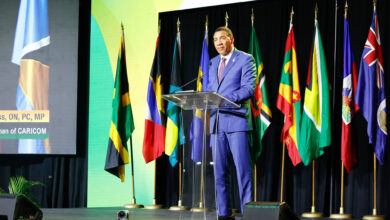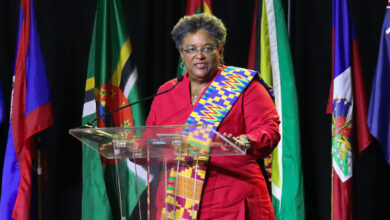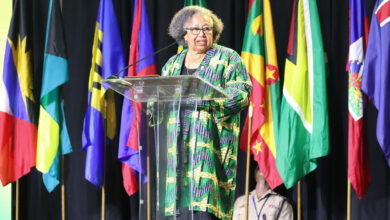GROS ISLET, SAINT LUCIA – “CARIFORUM-EU negotiations for an Economic Partnership Agreement are at a propitious juncture, having successfully advanced through two preliminary phases. Emerging from the current Regional Integration phase, both sides have a better understanding of their respective economic spaces, as the two regions move closer to docking. We have had a successful Phase II, and stand ready to emerge from it with momentum. The negotiations are poised to undergo a qualitative shift in specificity.” These were the sentiments of CARIFORUM Principal Negotiator for EPA Negotiations and Director General of the Caribbean Regional Negotiating Machinery (RNM) Ambassador Dr. Richard Bernal, who today (September 28) met with his counterpart Mr. Karl Falkenberg (Deputy Director General, DG Trade-European Commission) in Saint Lucia, on the occasion of the Fourth Meeting of CARIFORUM-EC Principal Negotiators.
The results of today’s meeting will form an important input into the Second CARIFORUM-EC Ministerial Meeting, slated for September 30, also to be convened in Saint Lucia, to review progress in Phase II of Economic Partnership Agreement (EPA) negotiations, provide political instructions on the future orientation of those negotiations and consider issues germane to Phase III.
Ambassador Bernal highlighted that for CARIFORUM, there are three objectives to be pursued in Phase III of EPA negotiations, namely: a) forging an agreement on the structure of an EPA; b) consolidating the outcome of discussions on the priority issues for CARIFORUM regional integration; and, c) agreeing on an approach to trade liberalization, which is development promoting and cognizant of the need to address the issue of sensitive products and best practices for private sector operators and the business environment. In this vein, in keeping with the vision of the EPA being a modern trade agreement, the expectation on the part of CARIFORUM is for the EPA to contribute to an environment in which corporate entities can improve their global competitiveness. The EPA must mediate the Region’s transition to full international competitiveness.
Ambassador Bernal reaffirmed that an EPA must provide for a new development dynamic, helping to foster a single economic space, which is synchronized with the dynamic aspects of the global economy, through openness to flows of capital, investment, knowledge and technology. “It is not just the integration of the Region’s economy within the global economy that is important, but the manner in which that integration takes place,” he said; underscoring that how that integration is undertaken and the benefits accrued from it will be dependent on the development dimension of the EPA, and how it addresses the sustainable development of the Region.
The two sides agreed that the structure of the work programme in Phase III should centre on four negotiating groups: a) Market Access (covering non-Agricultural Market Access and Agriculture); b) Services and Investment; c) Trade-Related Issues; and, d) Legal and Institutional Issues.
Both sides shared the view that an EPA holds the promise of being a model for how developed and developing countries can cooperate in the trade promotion of development.
Reflecting on Phase II, Mr. Falkenberg acknowledged that considerable technical preparatory work had been undertaken and completed in preparation for negotiations in Phase III. This view was endorsed by Ambassador Bernal, who characterized the second phase of negotiations as having been a “qualified success,” faithful to the Joint Plan and Schedule. The Plan and Schedule had been agreed to by the two sides at the launch of CARIFORUM-EC EPA negotiations in April 2004, which established the phasing and sequencing of negotiations over a three and a half year period.
In addition to developing an understanding of respective regional economic spaces that will assume commitments in an EPA, for CARIFORUM, Phase II also had as its objective identifying priority areas to be supported by an EPA. A meeting of the Regional Preparatory Task Force (RPTF) – established in order to cement the strategic link between EPA negotiations and development cooperation – yesterday took stock of these priority areas. Altogether, there are eleven CARIFORUM proposals for strengthening regional integration, that have been submitted to the European Commission in Phase II.
Ambassador Bernal reaffirmed the principle of variable geometry in EPA negotiations, in light of the three streams of regional integration processes in existence within the Region, namely, the Organisation of Eastern Caribbean States (OECS) – a customs union with a common currency and common judiciary; the Caribbean Community which is completing the establishment of a Single Market and Economy; and the CARICOM-Dominican Republic FTA. All three CARIFORUM integration processes are being pursued at varied pace and depth, hence differentiation amongst CARIFORUM members is one of the essential planks of the Region’s approach to regional integration.
Led by Ambassador Bernal, the CARIFORUM[1] delegation at today’s meeting comprised Brussels-based Ambassadors for Barbados, the Dominican Republic, and Trinidad & Tobago. Some CARIFORUM country Capital-based trade officials were also present, along with representatives of the CARIFORUM, CARICOM and OECS Secretariats, and the RNM. In addition to Mr. Falkenberg, there were Brussels-based representatives of the European Commission and officials from the Commission’s Caribbean-based Delegations attending the meeting.
A CARIFORUM Ministerial caucus is slated for tomorrow (September 29), ahead of Friday’s CARIFORUM-EC Ministerial meeting.
[1] For the purposes of EPA negotiations, fifteen Caribbean countries constitute the regional configuration called the Caribbean Forum of ACP States (CARIFORUM); they are: Antigua & Barbuda, The Bahamas, Barbados, Belize, Dominica, the Dominican Republic, Grenada, Guyana, Haiti, Jamaica, St. Kitts & Nevis, St. Lucia, St. Vincent & the Grenadines, Suriname, and Trinidad & Tobago.
European UnionPress ReleasesSaint Lucia




